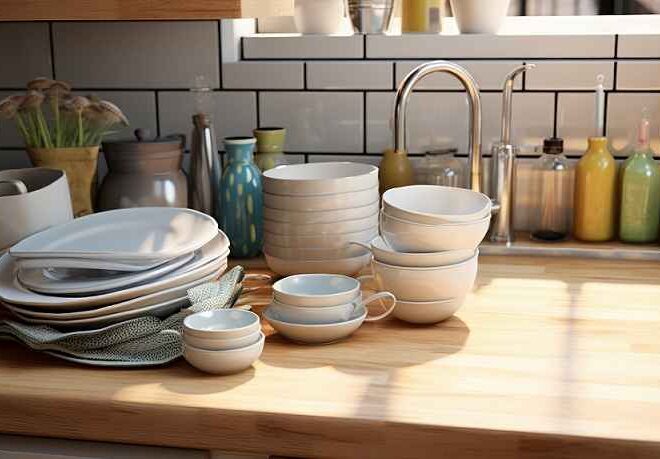
Natural Solutions: How to Tackle Sticky Grease on Your Kitchen Surfaces
Welcome to the ultimate guide for every home chef and kitchen enthusiast! We’ve all been there: a culinary masterpiece emerges from the oven, only to leave behind a battlefield of sticky grease on your countertops. Fear not! In this blog post, we’re diving into natural solutions that will transform your cleaning routine from a daunting chore into an effortless breeze. Say goodbye to harsh chemicals and hello to eco-friendly alternatives that are as effective as they are gentle on surfaces—and your senses. Whether you’re battling greasy splatters or stubborn residue, we’ve got you covered with tips and tricks that harness the power of nature. Get ready to reclaim your kitchen space and make it shine like never before!
Sticky grease. It’s that unwelcome guest in your kitchen, appearing out of nowhere and clinging to your surfaces like a stubborn stain. Whether it’s splatters from frying or drippings from cooking, greasy residue can quickly turn your culinary haven into a messy battlefield. You might think you need harsh chemicals to fight this greasy foe, but there are better ways to restore cleanliness without compromising the air you breathe or the environment around you. Let’s explore some natural solutions for tackling sticky grease while keeping your kitchen fresh and safe!
Understanding the Different Types of Grease and Why They Stick
Grease in the kitchen can be a tricky foe. It’s not just one type; there are several, each with its own characteristics.
Cooking oils, for instance, are common culprits. They come from various sources—vegetable, animal, or synthetic—and can leave behind a sticky residue that clings to surfaces.
Then there’s carbonized grease. This occurs when food particles burn and blend with oil, creating an almost tar-like substance that sticks stubbornly.
Baked-on grease is another category formed through repeated cooking without thorough cleaning. It hardens over time and becomes increasingly difficult to remove.
The adhesive nature of these greases stems from their composition and how they interact with heat and air. As they cool down after cooking, they solidify quickly, making them even harder to tackle later on. Understanding these types helps in choosing the right removal techniques tailored to your specific situation.
Harmful Chemicals Found in Common Cleaning Products
Many people don’t realize the hidden dangers lurking in their cleaning supplies. Common household cleaners often contain harmful chemicals that can harm our health and the environment.
Ingredients like ammonia and bleach are notorious for irritating skin, eyes, and lungs. Prolonged exposure may even lead to respiratory issues or allergic reactions.
Phthalates, found in fragrances of various products, have been linked to hormonal disruptions. This is particularly concerning for families with young children or pregnant women.
Moreover, VOCs (volatile organic compounds) evaporate into our indoor air quality as we clean. They contribute to headaches and dizziness while potentially exacerbating asthma symptoms.
Choosing natural alternatives not only protects your home but also ensures a safer space for loved ones. Making informed decisions about cleaning products can create a healthier living environment without sacrificing cleanliness.
Natural Ingredients That Can Effectively Remove Grease
When it comes to tackling sticky grease, natural ingredients can be surprisingly effective. They provide a safe alternative without the harsh chemicals found in many commercial cleaners.
One standout is vinegar. Its acidity breaks down greasy residues easily while leaving surfaces sparkling clean.
Baking soda is another powerhouse. It acts as a mild abrasive, perfect for scrubbing away stubborn stains without scratching your surfaces.
Lemon juice not only smells wonderful but also contains citric acid, which cuts through grease and leaves a fresh scent behind.
Don’t overlook salt either; its coarse texture makes it an excellent companion for scrubbing tough spots when mixed with other ingredients like lemon or vinegar.
Together, these natural solutions help you fight off that dreaded sticky grease effectively and safely!
Step-by-Step Guide for Removing Sticky Grease from Kitchen Surfaces
When it comes to battling sticky grease, a methodical approach is key. Start with vinegar and baking soda for a powerful combo. Spray the area with vinegar, then sprinkle baking soda on top. Watch as they fizz together, breaking down stubborn residue.
Next up: lemon juice and salt. Squeeze fresh lemon juice over greasy spots and add a sprinkle of salt for extra abrasiveness. Let it sit for about 10 minutes before scrubbing gently.
For those who love DIY solutions, mix equal parts water and white vinegar in a spray bottle for an all-purpose cleaner that’s tough on grease yet gentle on surfaces.
Don’t forget to wipe everything clean afterward with warm water to remove any lingering residues from your natural cleaners. Regular maintenance will make these tasks easier each time you cook or bake!
Using Vinegar and Baking Soda
Vinegar and baking soda are a dynamic duo for tackling sticky grease. Their natural properties make them an excellent choice for effective cleaning without harsh chemicals.
Start by sprinkling baking soda directly on the greasy surface. Its coarse texture works wonders in breaking down stubborn residue.
Next, spray or pour vinegar over the baking soda. You’ll notice a fizzing reaction—a sign that the two ingredients are working together to lift grime away.
Let it sit for about 10 minutes to allow their combined power to penetrate tough spots. Afterward, wipe with a damp cloth or sponge. Rinse thoroughly to remove any remaining residue.
This method not only cleans but leaves your kitchen smelling fresh too! Give it a try next time you face pesky grease stains on countertops, stovetops, or backsplashes.
Lemon Juice and Salt Method
The lemon juice and salt method is a powerful duo for conquering sticky grease. The natural acidity of lemon juice breaks down the grease, while salt acts as an abrasive to scrub it away.
Start by cutting a fresh lemon in half. Squeeze the juice directly onto the greasy area. Let it sit for a few minutes to allow the citric acid to penetrate and dissolve stubborn residues.
Next, sprinkle coarse salt over the same spot. Use one half of the lemon as your scrubbing tool, gently rubbing in circular motions. This not only lifts the grime but also leaves behind a refreshing scent.
Rinse with warm water afterward to remove any lingering residue. Your surfaces will shine without harsh chemicals or artificial fragrances! Embrace this simple yet effective method next time you face that pesky sticky grease in your kitchen.
DIY All-Purpose Cleaner Recipe
Creating your own all-purpose cleaner is simple and cost-effective. Plus, it helps you avoid harmful chemicals.
Start with a spray bottle. Combine one cup of vinegar and one cup of water for a basic solution. Vinegar works wonders against sticky grease due to its natural acidity.
For a fresh scent, add 10-15 drops of essential oil like lemon or tea tree. These oils not only smell delightful but also have antibacterial properties.
Give the mixture a good shake before each use. Spray directly on greasy surfaces and let it sit for five minutes. This allows the solution to break down stubborn grime effectively.
Wipe clean with a microfiber cloth for best results. Not only will your kitchen shine, but you’ll also enjoy peace of mind knowing you’re using environmentally friendly ingredients that are safe for your home.
Tips for Preventing Sticky Grease Buildup in the Future
Preventing sticky grease buildup starts with simple habits. Regularly wipe down surfaces after cooking. A quick clean can save you from tougher scrubbing later.
Consider using splatter guards while frying. They shield your counters and stovetops from greasy messes, making cleanup easier.
Choose the right cookware too. Non-stick pans can significantly reduce grease that clings to surfaces during meal prep.
Ventilation plays a key role as well. Turn on exhaust fans or open windows when cooking to minimize smoke and grease settling on surfaces.
Finally, store oil properly in sealed containers away from heat sources. This not only keeps your kitchen organized but also reduces the likelihood of spills that lead to sticky situations.
Eco-Friendly Alternative: Reusable Cleaning Cloths
Swapping out paper towels for reusable cleaning cloths is a game changer in the kitchen. These cloths not only reduce waste but can tackle sticky grease with ease.
Made from absorbent materials, they’re designed to soak up spills and grime effectively. When they get dirty, simply toss them in the washing machine—good as new!
You can make your own cloths using old t-shirts or cotton fabrics, which keeps it eco-friendly and thrifty. Plus, you’ll have a variety of textures that work well on different surfaces.
Using reusable options also means fewer chemicals leaching into your home environment. They’re safe for children and pets alike while being tough enough to handle any mess.
Embracing this simple switch contributes to a healthier lifestyle while maintaining cleanliness throughout your kitchen.
Conclusion: Embracing a More Sustainable and Healthier Way to Tackle Sticky Grease
Embracing natural methods to tackle sticky grease not only keeps your kitchen surfaces clean but also promotes a healthier home environment. By opting for eco-friendly solutions, you minimize the impact of harmful chemicals on both your health and the planet. With simple ingredients like vinegar, baking soda, lemon juice, and salt at your disposal, you can effectively combat even the toughest grease without breaking a sweat.
Additionally, adopting reusable cleaning cloths helps reduce waste while providing an effective way to keep surfaces spotless. Making these small changes in your cleaning routine can make a world of difference in maintaining a fresh and inviting kitchen.
As you implement these techniques into your daily life, you’ll find that tackling sticky grease becomes less of a chore and more of an empowering practice towards sustainability. Embrace this journey toward cleaner living today!


